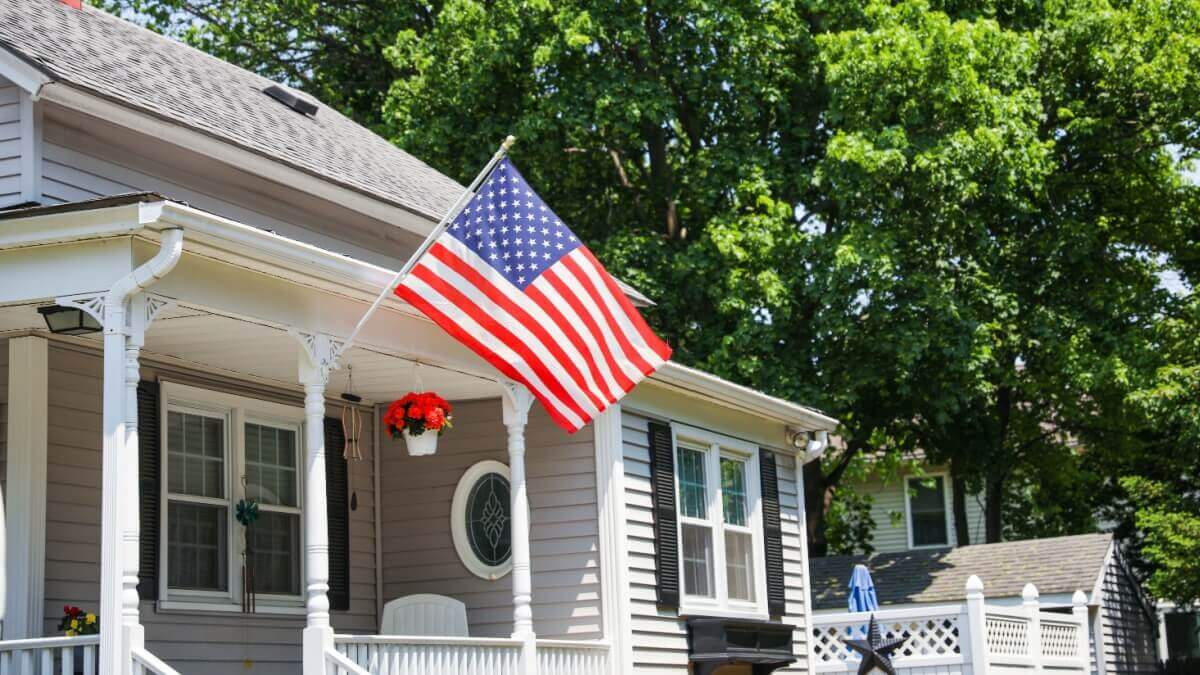What is the 'Nota Simple' in Spain and how do you get one?
Everything you need to know about the Nota Simple in Spain - an essential document for buying property - including how you can get it and how much it costs.

Planning a move across the pond? If you’re taking the exciting step of moving to the US from the UK, one of the first things you’ll need to organise is accommodation.
Some UK expats prefer to rent for a while before buying property overseas, while others prefer the security of owning a home from day one.
If you’re thinking of buying property in the US, read on. We’ve put together the ultimate guide for foreigners moving to the United States, covering all the essentials you need to know.
This includes a run-through of the buying process, info on taxes and fees, the latest US property prices and some of the pitfalls to avoid.
If you’re looking for ways to save money on currency exchange when buying property in the US, check out the money services provider Wise. You can send large transfers with Wise for low fees* and great exchange rates - making it ideal if you’re sending a secure international transfer.
Before you start your house hunt, it can be useful to know a little about how the process of buying property works in the US.
Here’s a quick overview of the steps involved:¹
The first crucial step before you arrange any viewings is to arrange your finances. You need to set your budget for the purchase, making sure to factor in all fees, taxes and other costs (more on this later). This is also a good time to pin down exactly what you’re looking for and where.
You might also need to apply for pre-approval for a US home loan. Alternatively, you can make arrangements to finance your purchase in other ways - such as getting a loan from a UK bank, refinancing a property you already own elsewhere to release cash, or using savings.
If you don’t already have one, you’ll need to apply to the Internal Revenue Service (IRS) for an Individual Taxpayer Identification Number (ITN). This is a tax number for non-US citizens who don’t have a Social Security Number (SSN).
It isn’t absolutely essential for property purchases, but it is a key requirement for applying for US mortgages or opening a US bank account. Both of these may be crucial for your purchase.
With some of the admin out the way, you can now start searching for a property to buy.
You can use online property portals, or tap into the expertise of local realtors to find properties that match your criteria and arrange viewings. An expert can also guide you through the steps involved in the purchase process, which can vary between states.
Once you’ve found your dream home, you’ll need to make a competitive offer or bid in writing. You’ll submit it either to the real estate agent or directly to the seller. At this stage, negotiations on price may take place.
If your offer is accepted, the next step is to appoint a real estate attorney to carry out some checks on the property. This includes doing a title search to check the legal ownership of the property, along with whether there are any disputes, claims or other issues which could impact the sale.
You’ll also want to arrange for a property inspection, to check for structural damage or any other issues with the building. In some areas and for some properties, you might also need to have specialist surveys done for things like termites or flood risk.
This is the formal and legally binding contract signed by both parties which outlines the terms and conditions of the sale.
You’ll also pay what is known as an ‘earnest money deposit’ as a sign of good faith and commitment to the purchase. This is usually only around 1-3%.
If you’re still in the UK, you’ll need to find a cost-effective way to make an international transfer to cover this - read some tips on how to do this here.
This is the time to contact your mortgage provider to finalise the loan. The provider may need to carry out an appraisal of the property.
This is when the purchase is finalised. Your real estate attorney will be crucial to helping with this, as there’s plenty of paperwork and legal steps to be completed. This includes:
And then all that’s left is for you to pick up the keys to your new home.
| 💡 Read more: The best UK banks for sending money abroad |
|---|
US banks and providers do offer mortgage loans to foreigners, but the conditions, requirements and rates may differ compared to how it works for locals.
For example, you might have to pay a larger down payment as a non-resident, or have to pay higher interest rates or submit more extensive documentation as part of your application.
The requirements for application will vary between banks, but generally you’ll need the following:¹
Alongside the property price, you also need to budget for the fees and taxes which may apply to your US property purchase.
Here are the essential costs you need to know about:
It’s important to remember that many of these costs (and who pays them) will vary by state, so you’ll need to check in the area you’re buying within.

The US property market has had a difficult few years, with high property prices and high mortgage rates creating something of an affordability crisis for homebuyers.
The good news is that there have been some recent improvements. Property prices unfortunately remain high, up 2.9% compared to the previous year. But mortgage rates are falling, with recent rates the lowest they’ve been for more than 2 years.³
Yes, foreigners can buy property in the US. However, it’s important to remember that there can be significant differences between states when it comes to real estate laws, taxes and other conditions.
So, you’ll need to check the requirements in the area you’re looking to buy in.
Buying a property in the US does not give you automatic or direct rights to permanent residency.
To live in the US, you’ll need an appropriate visa or residence status which must be applied for separately to the house purchase process.
To apply for residency there as a UK citizen, you’ll usually need to go down the route of employment, starting a business, studying or having family ties in the US.
Now we come to the all important question - how much money do you need to afford your dream home in the US?
Across the whole country, the average property price in the US is $361,282 (approx. £286,200 in GBP).³ In the UK, the average property price is almost the same, coming in at £288,533 as of July 2024.⁴
Although of course, it depends on the type of home and the exact area you’re buying in.
To narrow it down a little further, here’s a guide to what you can expect to pay per square metre in some of the US’s major cities:⁵
| City | Average apartment price per sq.m - city centre | Average apartment price per sq.m - outside city |
|---|---|---|
| New York, NY | $18,356 | $12,897 |
| Boston, MA | $11,536 | $6,724 |
| Washington, D.C | $9,804 | $6,521 |
| Los Angeles, CA | $7,499 | $6,854 |
| Seattle, WA | $7,197 | $5,294 |
| Miami, FL | $6,616 | $4,023 |
| Austin, TX | $4,737 | $2,953 |
| Portland, OR | $3,648 | $3,320 |
| Chicago, IL | $3,552 | $3,153 |
| Atlanta, GA | $3,241 | $2,531 |
| Phoenix, AZ | $3,181 | $2,913 |
Remember though that property prices will also vary depending on the type of property.
Another thing to note when figuring out the price for property in the US is that international transfers could get expensive, especially if the provider adds a margin to the exchange rate to convert your pounds. Consider checking out Wise to securely handle your large transfers with mid-market exchange rates and low, transparent fees*.
Of the major US cities in our list above, Atlanta and Phoenix are among the cheapest. But you can also snap up homes even more cheaply in places like Houston, Texas and Tucson, Arizona.
Other places which regularly top the list of most affordable house prices in the US include:⁶
If you’re on a tight budget, you may be best looking outside of city centres and popular urban areas.
The two main routes to find property to buy in the US are local real estate agencies and online property websites.
It isn’t mandatory to use a real estate agent (realtor) to find a property to buy overseas. But it can be very helpful if you’re moving to the US from the UK and are unfamiliar with the local property market.
When choosing a realtor, make sure to check out their credentials. All real estate agents should be licensed in the state they operate in. A good place to start is professional organisations such as the National Association of Realtors (NAR).
You can also search for property in the US online, from the comfort of your current home in the UK.
Here are some popular US real estate websites to check out:

The US is considered to be a safe place to buy property, as long as you take sensible precautions to protect yourself from scams and fraudsters.
But there are some pitfalls and risks to look out for, including the following:
The right property for you will all depend on your search criteria - specifically, where and what you want to buy, and how much you can afford to spend.
If you’re not already living there, it’s worth making a trip to the specific town or city in the US you’re interested in. You’ll want to check out the local area and view properties, making sure to pay attention to local transport links and amenities.
It’s a good idea to do as much research as possible before committing to purchase a property. A crucial step is checking the title deeds for any outstanding claims, disputes or conditions.
You’ll also want to commission a property inspection, which will flag up any major issues and give you a better idea of what you’re buying.
Before you can get the keys to your new home, you’ll have a final few tasks to check off your list.
These include taking out insurance, setting up your utilities and carrying out any energy efficiency renovations.
It’s strongly recommended to take out a home insurance policy starting from your completion date. It may even be a mandatory condition from your home loan provider.
If you know when your completion date will be, it makes sense to get some essentials set up in advance of moving in.
A prime example is utilities, such as heating, power and water. Get these sorted as early as you can, and the moving process should be a little smoother.
Purchased a US property with an older heating system or minimal insulation?
From heating and insulation upgrades to double glazing and draught proofing, there are lots of things you can do to improve the energy efficiency of your new home.
And that’s about it - our comprehensive guide to buying property in the US for foreigners.
We’ve covered all of the essential info you need to know, including tips for starting your search, average property prices in the US and what fees and taxes are involved. You should also now have a better idea of how the buying process works in the US.
And, if you want to save money while buying your new property in the US, make sure to use the Wise account to send your international transfer. It’s not a bank account but offers many similar features.
Here are the main benefits for using Wise: |
|---|
|
Sources used:
Sources last checked on date: 28-Oct-2024
*Please see terms of use and product availability for your region or visit Wise fees and pricing for the most up to date pricing and fee information.
This publication is provided for general information purposes and does not constitute legal, tax or other professional advice from Wise Payments Limited or its subsidiaries and its affiliates, and it is not intended as a substitute for obtaining advice from a financial advisor or any other professional.
We make no representations, warranties or guarantees, whether expressed or implied, that the content in the publication is accurate, complete or up to date.

Everything you need to know about the Nota Simple in Spain - an essential document for buying property - including how you can get it and how much it costs.

Read our guide on how to transfer money to buy property overseas, including all of the best options for UK residents and steps to set up a large transfer.

Read our guide on how to transfer money to buy property in Spain, including all of the best options for UK residents and steps to set up a transfer.

Read our complete guide to selling your property in Barbados, including info on the process, fees, taxes, legal requirements and more.

Read our comprehensive guide to getting a mortgage in Turkey from the UK, covering everything you need to know.

Read our essential guide to property tax in Turkey for foreigners and UK expats, including taxes on buying, selling and renting out property.